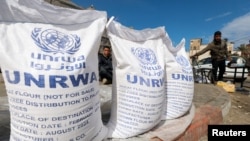An external review of the neutrality of the U.N. agency that assists Palestinian refugees has concluded that the agency has a number of procedures and mechanisms in place to ensure its neutrality, but there is room for improvement.
“There is always room for improvement and some issues related to neutrality persist; this is why this mission was created,” Catherine Colonna, the commission’s chair, told reporters at a briefing at the United Nations in New York.
Of the agency known as UNRWA, she cited instances of staff publicly taking sides, school books that had some “problematic content,” and a politicized staff union that she said made operational disruptions and threatened management.
U.N. Secretary-General Antonio Guterres commissioned the former French foreign minister to head up an external review of UNRWA in early February, following accusations from Israeli officials that a dozen of the agency’s staffers was involved in the deadly October 7 terror attacks inside Israel.
Nine of the staffers were immediately fired, one was confirmed dead, and officials were clarifying the identity of two others.
Colonna worked with experts from three Scandinavian research groups -- the Raoul Wallenberg Institute in Sweden, the Christian Michelsen Institute in Norway, and the Danish Institute for Human Rights.
She handed over her report to Guterres on Saturday, along with a list of about 50 recommendations.
“I am confident that implementing these recommendations will help UNRWA fulfill its mandate and restore confidence where needed,” Colonna told reporters.
Israeli foreign ministry spokesperson Oren Marmorstein rejected the report.
"The Colonna report ignores the severity of the problem, and offers cosmetic solutions that do not deal with the enormous scope of Hamas' infiltration of UNRWA," he said in a press release. "This is not what a genuine and thorough review looks like. This is what an effort to avoid the problem and not address it head on looks like."
Saying UNRWA is part of the problem in Gaza, he called on donors not to fund the agency and instead to give their money to other aid organizations working in Gaza.
UNRWA Commissioner General Philippe Lazzarini welcomed the report's findings and said he is working on an action plan to implement its recommendations.
"Safeguarding the neutrality of the agency is central to our ability to continue saving lives and contributing to the human development of Palestine refugees in the Gaza Strip as it faces an unprecedented humanitarian crisis, and in the West Bank (including East Jerusalem), Syria, Lebanon and Jordan," he said in a statement.
Conclusions
The commission concluded that while the agency has made changes and improvements since 2017, more could be done, including strengthening its internal oversight capacity, better vetting of staff, building trust with donors and improving neutrality in its education system.
While Israel verbally informed UNRWA leadership of the allegations against the 12 staffers, the commission found that while UNRWA shares the names of its staffers with Israel, Israel had not relayed any concerns to UNRWA about any staffers since 2011.
The commission also said that while Israel has since made claims about a “significant number” of UNRWA employees being members of terrorist organizations, it “has yet to provide supporting evidence of this.”
Colonna was clear that her team’s mandate did not involve the allegations involving the dozen staffers – that is being handled by an internal U.N. investigation.
Israel for many years has accused UNRWA of allowing its premises to be misused for political or military purposes, including by Hamas. The commission concluded that the operating procedures for regular inspections of premises “appear to be appropriate,” but recommended that they happen more frequently than the current four times per year.
On allegations that UNRWA schools use textbooks containing anti-Semitic or anti-Israel language, the commission said the most recent review of school books from the Palestinian Authority from 2022-2023, found that 3.85% of all pages contained “issues of concern to “U.N. values, guidance, or U.N. positions on the conflict.”
“Even if marginal, these issues constitute a grave violation of neutrality,” the commission’s report said, adding more work needs to be done between UNRWA and the Palestinian Authority to avoid promotion of discrimination and incitement to hatred and violence and the spreading of anti-Semitic views.
“The Secretary-General accepts the recommendations contained in Ms. Colonna's report,” Guterres’ spokesperson, Stephane Dujarric, said. “He has agreed with Commissioner General Philippe Lazzarini that UNRWA, with the Secretary-General’s support, will establish an action plan to implement the recommendations contained in the Final Report.”
Guterres urged donors, staff and UNRWA host countries to fully cooperate in the implementation of the recommendations.
“Moving forward, the Secretary-General appeals to all stakeholders to actively support UNRWA, as it is a lifeline for Palestine refugees in the region,” Dujarric said.
Following the allegations against the staffers, 16 donors, including top contributor the United States, suspended contributions totaling around $450 million. Since then, some have resumed, and some new donors have contributed. Last week, the agency’s chief said they have funding to cover operations through June.




